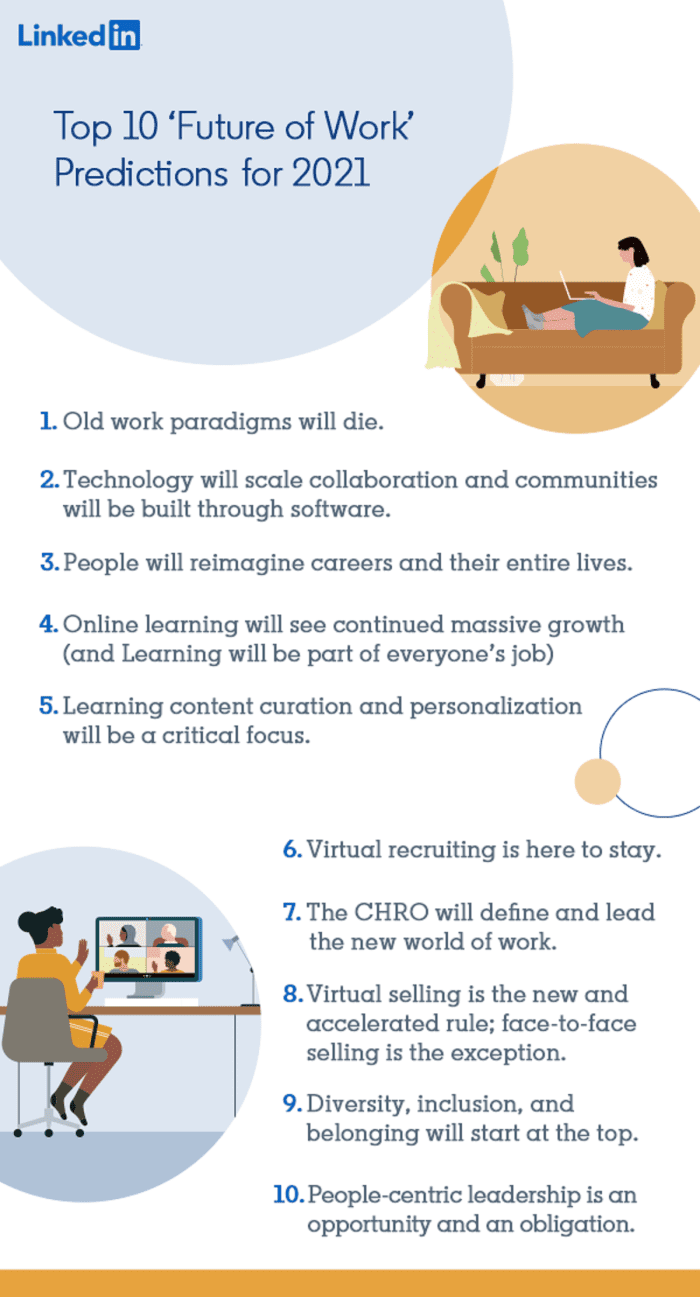
ndia will reimagine the future of work across 5 key segments: the workplace, careers, recruiting, business, and leadership.
As 2020 comes to a close, LinkedIn, the world's largest online professional network, shared 10 key predictions that will define the future of work in 2021. India will reimagine the future of work across 5 key segments: the workplace, careers, recruiting, business, and leadership.
Here are the Top 10 ‘future of work’ predictions:
Old work paradigms will die
Only 1 in 4 Indian professionals were offered flexible work hours and well-being support during the early stages of the lockdown this year. This will change in 2021, as companies recognize new employee needs - many of which would depend on sectors and geographies - in an increasingly remote reality where commutes may soon become a thing of the past. Be it location, work hours or ways of working, flexible work policies will play a dominant role in defining a positive work culture in the future. Those going back to work can expect their offices to transform into spaces where professionals will gather for leadership and personal development, or simply to collaborate and congregate.
Technology will scale collaboration and communities will be built through software
In an increasingly remote reality, employees want to collaborate and work more efficiently and facilitating this will require technology that offers transparency, and is easy to use. This shift reflects strongly across the Indian workforce as Virtual Events on LinkedIn in India have grown 4x since March, and India has become one of the top 5 countries creating Virtual Events on the platform. Given this swift emergence of virtual collaboration, professionals will welcome the new world of work by expanding their tech skills and remote work acumen.
People will reimagine their careers and entire lives
Job seekers will continue pivoting their careers to work in different industries or geographies, as 3 in 5 (62%) unemployed job seekers in India report being open to the idea of exploring new career paths to navigate these challenging times. Further, remote jobs are an emerging trend in APAC, and India is found leading the region in terms of remote job application growth, which grew by 4.65x between March and May 2020. The new normal will also see the rise of ‘solo entrepreneurs’ as people are expected to use the internet to maximize their skills and talent, in a bid to reimagine their lives and careers.
Online learning will see continued massive growth and learning will be part of everyone’s job
Online learning will continue to be a critical tool in helping Indian professionals future-proof their careers. LinkedIn data states that the average number of monthly learning hours on LinkedIn Learning increased 3X from April to December 2020, compared to pre-Covid months of January and February. As per LinkedIn’s year-end findings, 3 in 5 (57%) professionals say they will increase their time spent in online learning going forward. With this renewed focus on skilling, people are turning to online learning to build the right mix of digital and soft skills, to upskill and to land new opportunities within the same company.
Learning content curation and personalization will be a critical focus
As demand for online learning picks up, curating high-quality content and personalized recommendations for individual learners will be a key focus going into 2021. This will help learners efficiently sift through the myriad options to find the right content, given the vast amounts and high frequency of content creation triggered by the increasing demand for online learning.
Virtual recruiting is here to stay
As per LinkedIn’s ‘Future of Recruiting’ report July 2020, 4 in 5 talent professionals in India agree that virtual recruiting will continue post-COVID (81%), and that virtual interviews will become the new standard (79%). Companies have dabbled with video interviewing and remote assessments in the past, but the lockdown realities of COVID-19 have sparked them to create an end-to-end virtual recruiting process for the first time. Therefore, just as hybrid workforce models are set to become the standard, a hybrid hiring process that combines virtual and in-person elements will become the norm.
The CHRO will define and lead the new world of work
Many CHROs will lead the way towards diversity, skill-first hiring, internal mobility, and remote work offerings. LinkedIn data suggests that more than 4 in 5 (85%) HR and recruiting professionals in India believe that reskilling of the workforce is very impactful in reshaping the future of recruiting. Internal mobility also continues to gain prominence across the APAC region. Compared to their 5-year average, most Asia-Pacific nations recorded an increase in internal mobility rates in 2020, with India seeing the highest growth of 5% to reach 13% through 2020. Fueling these trends, the CHRO will play a key role in the future of recruiting.
Virtual selling is the new and accelerated rule; Face-to-face selling is the exception
After a strong emergence in 2020, virtual selling is now gaining prominence and face-to-face engagements will take a backseat. Pointing towards this growing importance of virtual selling, LinkedIn data show that between Jan to Mar and Apr to Jun 2020, the time spent learning about ‘Social Selling’ on LinkedIn Learning increased q-o-q by 61%. Data also shows that globally, more than 80% of the Forbes Cloud 100 uses Sales Navigator. This online shift is expected to sustain in 2021, and in the years ahead, virtual selling will lead sales with more scrutiny on the why, how, and ROI of face-to-face meetings.
Diversity, Inclusion, and Belonging will start at the top
Leaders who welcome everyone to bring their authentic selves and support them to work will reap benefits like richer culture, higher engagement, more creativity, and better business results. As 2021 approaches, top leaders own an enormous opportunity of bringing diversity, inclusion, and belonging to the table. With flexible job options and remote working models becoming the norm, India’s female workforce participation increased from 30% in April to 37% by the end of July. This improved gender parity was most prevalent across the Corporate Services, Education, Health Care, and Media & Communications industries.
People-centric leadership is an opportunity and an obligation
Leaders with compassion understand that successful strategies start with human beings at the center. Enabling a culture of solidarity, transparency, and shared mission will help leaders motivate their employees and unlock higher productivity and stronger employee relations. Companies must practice healthy doses of compassion to keep their employees at the center of all strategies, and to do that, HR disciplines like talent acquisition, employee engagement, and learning & development will collaborate on delivering a holistic employee experience.

No comments:
Post a Comment